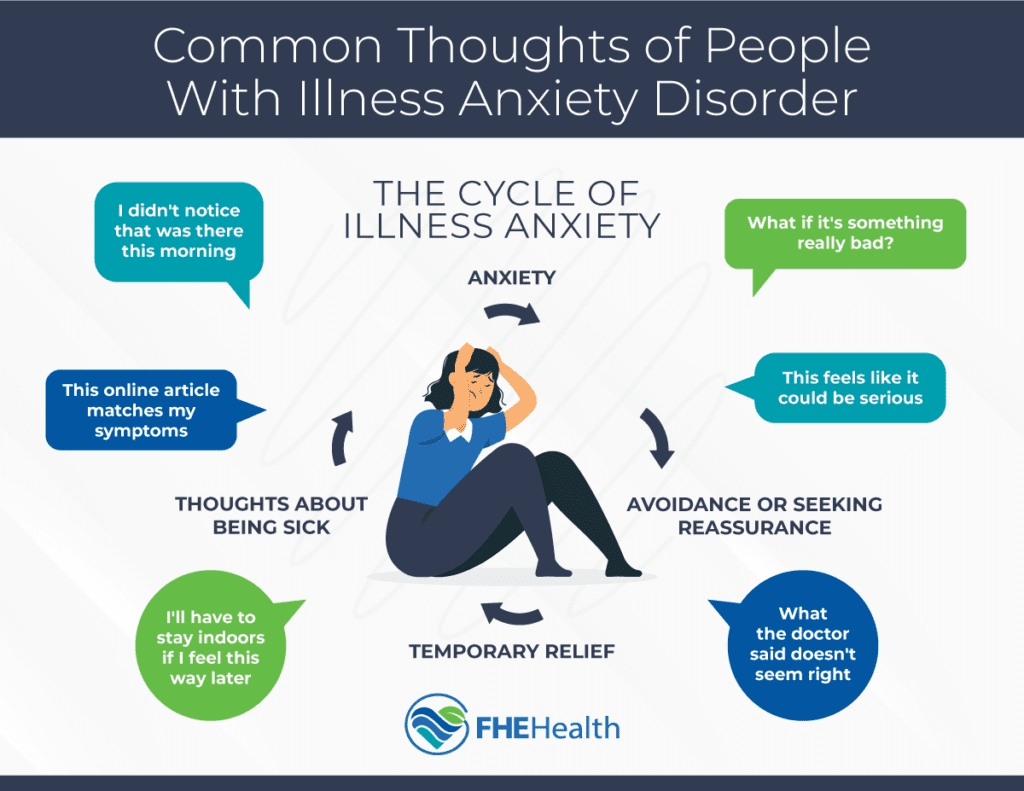
Have you ever been called a hypochondriac? From your perspective, you may have a perfectly reasonable fear of being sick. But this fear could be the result of a mental health condition that constantly interrupts your life and well-being.
Hypochondriasis, now known as illness anxiety disorder, is a type of anxiety disorder in which a person obsesses over the state of their health. Known to go hand-in-hand with somatic symptom disorder, this condition can cause ever-present exhaustion and terror. Take a closer look at the symptoms and consider whether your health anxiety is just that — or something more.
Understanding Illness Anxiety Disorder: A Closer Look
Illness anxiety disorder (IAD) is when a person excessively worries that they currently are, or are about to be, sick. There are no physical symptoms to justify these fears, yet the person can’t stop worrying. IAD can be a chronic condition and regularly impact a person’s daily life. Individuals with IAD pay very close attention to their bodies and mistake regular occurrences as signals of deteriorating health.
IAD used to be called hypochondriasis but was changed to illness anxiety disorder in the DSM-5, as the term “hypochondriac” is overly used and downplays the condition.
Having clinically significant health anxiety is relatively common. While the exact prevalence is unknown, experts estimate that as much as 13% of the general adult population experiences illness anxiety disorder at some point.
Symptoms of Illness Anxiety Disorder
The common symptoms of IAD are:
- Constantly thinking about having a serious health condition
- Regularly seeing medical health professionals and not believing them when they say you’re healthy
- Constantly taking medical tests
- Frequently talking about your health with loved ones
- Difficulty sleeping due to worrying about your health
- Constantly researching symptoms and health conditions
- Negative consequences at work, at school and in personal relationships due to the constant worrying about your health
- Avoiding people or places due to a fear of health risks
Causes of Illness Anxiety Disorder
The exact cause of illness anxiety disorder isn’t known, but certain risk factors seem to increase a person’s chances of developing the condition. These include:
- Being uncomfortable with normal body sensations and confusing them with symptoms
- Being naturally interested in researching health conditions
- Having been raised in an environment where health issues were discussed more than usual
- Experiencing a severe illness growing up or having a parent or sibling who experienced a health condition
- Having other anxiety disorders, such as generalized anxiety disorder
Illness anxiety disorder can develop at any age but most commonly appears in young adulthood, between 25 and 35. In some cases, IAD symptoms can get worse with age, especially if the individual doesn’t seek treatment.
Diagnosis of Illness Anxiety Disorder
Suspicions of IAD are often noticed first by the patient’s medical doctor. They see that their patient can’t seem to be calmed despite regular checkups, negative test results and reassurances that they’re healthy. Doctors may choose to bring up the IAD diagnosis if a patient has been consistently worrying about a condition while presenting no real symptoms for longer than 6 months.
A formal diagnosis may include filling out a questionnaire and having an in-depth conversation with a medical provider about your beliefs about your health.
Treatment and Coping Strategies for Illness Anxiety Disorder
Individuals who’ve noticed that their health anxiety is prevalent enough to negatively impact their daily life should seek help. Anxiety disorders, including IAD, are treatable. The most common form of treatment is cognitive behavioral therapy (CBT). This type of therapy can help you:
- Learn about illness anxiety disorder so you can understand how it impacts you
- Identify triggers and learn how to cope with them
- Learn how to shift your thinking so you no longer have distorted thoughts about your health
- Address deep fears and beliefs about your health
- Find new ways to respond to regular body sensations
Along with CBT, some people with illness anxiety disorder may benefit from taking antidepressants such as selective serotonin reuptake inhibitors (SSRIs) and serotonin-norepinephrine reuptake inhibitors (SNRIs). Studies have shown that antidepressants can have a positive impact on reducing IAD symptoms if taken for at least 6-12 months.
In addition to formal treatment, individuals with IAD may benefit from some coping strategies to reduce their symptoms:
- Getting regular exercise
- Eating a healthy diet
- Restricting research into health conditions
- Avoiding alcohol and substances, as these often increase anxiety symptoms
- Incorporating stress-reducing activities into your lifestyle, such as yoga, meditation and journaling
- Maintaining friendships and relationships and asking loved ones to watch your frequency of “health talk”
What Are the Differences Between Illness Anxiety Disorder and Somatic Symptom Disorder?
There are two types of health anxiety: illness anxiety disorder and somatic symptom disorder. These conditions are sometimes confused by people as being the same, but there are key differences.
Someone with IAD is worried about their health despite not having any real physical symptoms. In contrast, someone with somatic symptom disorder has an extreme focus on physical symptoms — such as pain or shortness of breath — to the point that it causes significant distress.
This person’s physical symptoms may or may not be related to a health condition, but their response to the symptoms is excessive and abnormal. Somatic symptom disorder is just as serious as IAD and can be incredibly disruptive to a person’s daily life.
What’s a “Normal” Amount of Health Anxiety?
Everyone worries about their health sometimes. But when your thoughts about your health are so constant and overwhelming that it affects your happiness, it’s time to seek help. If a doctor’s reassurances and negative tests aren’t enough for you to let a health fear go, consider talking to someone. After all, if you don’t learn to address and manage these fears, they may worsen and become even more disruptive to your well-being.
FHE Health Can Help
FHE Health is a full-service mental health and substance treatment facility. Our compassionate, knowledgeable staff can help you cope with your fear and enjoy your life. Contact us today to connect with our care team and start down the path to recovery.







